What is betaine?
What is betaine is a question asked by very few people; only organic chemists and those concerned about the breakdown of a toxic compound called homocysteine formed from protein-metabolism would be interested.
Oh and those with hepatic disease who may be facing a liver transplant.
For the structure of betaine I recommend looking at a biochemistry textbook or google it.
But if you want to improve your sense of well-being, make sure you are enjoying foods like beetroot regularly, even if you have no interest in knowing the reason why betaine is so important.
The richest sources are beets, spinach and 100% wholewheat; seafood too.
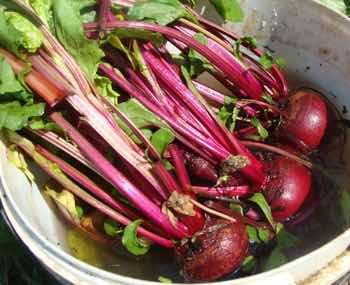
The complete absence of 100 percent real flour from supermarket-shelves is
probably the main reason for a betaine deficiency; and the attendant
cardiovascular and liver disease.
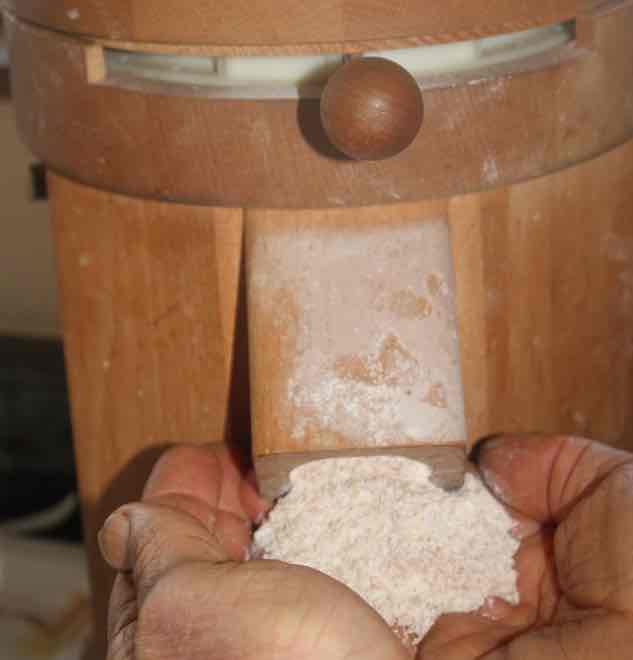
This page was last updated by Bernard Preston on 1st February, 2025.
Betaines are found in plant cells to prevent excessive water-loss. Their real importance to those concerned about having more energy and wellness, is their ability to donate methyl groups.
"Methylation" as it is known, is essential in human-metabolism and the common beetroot is an excellent source of betaine; so is true wholemeal flour.
It is increasingly being understood that it is a vital nutrient; and a deficiency is one of the causes of chronic-disease in many different systems in the body.
Because a shortage of betaine raises the level of toxic homocysteine in the blood, it is one of the chief underlying causes of damage to capillaries; and hence the effect on the heart, brain and liver. In fact it's needed by all the organs of the body.
Methionine is an "essential" amino acid
Betaine plays a vital part in the breakdown of an important essential amino-acid called methionine which is found in many foods such as meat, dairy and fish; we cannot thrive without it. A deficiency is one of the chief causes of the permanent stunting of children.
Whole grains, nuts and seeds are the chief sources of this protein for vegans; there's not much in legumes.
This methionine cycle occurs mainly in the liver and kidneys.
Without adequate methylation using betaine, levels of homocysteine rise causing improper lipid-metabolism.
This leads to fatty pancreas and liver, real killers; and a host of blood vessel related diseases like stroke and heart attack, all connected to poor-circulation. Add smoking to the equation and both arteries and veins will be in serious trouble.
Betaine is the source of methyl-groups in many biochemical processes in the body.
What is betaine?
What is betaine was originally found in sugar-beets, hence its name. It is a group of compounds involved in a very important reaction in the human body called methylation.
Likewise it's vital for other mammals and has been used in animal-feed for over half a century. For example in the poultry and pork industry it is added to reduce ugly and excessive body fat, especially in the internal organs; it can do the same for us.
In grains betaine is mainly found in 100% wholemeal but not in refined flour[2]; in the germ and bran. To enjoy it you first have to learn about storing wheat.
Beets, spinach and seafood are the other good sources.
Over-consumption of methionine
Methionine is an essential amino acid; we cannot thrive without it. However over-consumption from a diet high in meat and dairy is also associated with the growth of malignant tumours[5].
A methionine-restricted diet has been reported to inhibit the growth of cancer cells. Becoming a vegan may be beneficial.
Another strategy is to ensure a diet rich in betaines and choline to ensure the proper methylation of the amino acid.
TMG is a typical betaine; it consists of an amino acid called glycine with three methyl groups (CH3) than can acts as donors.
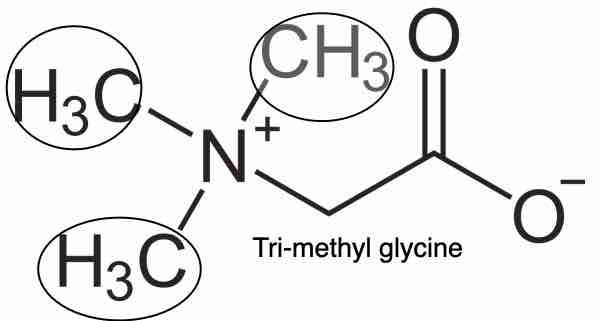 Note the 3 methyl groups attached to glycine
Note the 3 methyl groups attached to glycineThe big fat milling lie
"A whole grain, as defined by AACC International, should consist of the bran, germ and endosperm in the same proportions as found in nature."
There is a monumental lie in milling; they are allowed to label flour as "wholemeal" provided they do not extract more than than 40% of the grain; the germ and bran where the betaine is found. It comes as no surprise that heart-disease and stroke are by far the most common causes of death according to the WHO[1]; and rising fast.
Nature's natural anticoagulant, vitamin E also comes into the equation; the germ and bran of true wholemeal flour are the best sources.
So you see the questions about whole grains and what is betaine are not unimportant.
The betaine content of cereal-based foods varies from less than 10 milligrams to more than 1500 mg per 100 g.
100% wholewheat is likely to be the main dietary source of betaine, since other rich sources such as spinach, beets and shellfish are eaten in lower quantities.
The betaine content of refined meal is less than 25pc that of the 100% wholewheat flour.
- Journal of Cereal Science[6]
Choline
Betaine is also a breakdown product of the vitamin-like substance known as choline; but the traditional grocery store mix of foods contains 50 percent or less of this important nutrient.
So we are likely not getting sufficient betaine from our meals.
Choline too is found mostly in 100% wholewheat, rarely eaten except as bulgur in the West; and in eggs, legumes and green leafy vegetables.
Try and purchase true wholemeal flour and you will know what I mean.
Here you can find more information about choline food sources.
Choline is used in at least three ways in the body.
- To form betaine.
- For the neurotransmitter acetylcholine.
- For phospholipids in cell membranes.
Adequate choline is obviously vital for optimal-wellness.
"Dietary betaine reduces the amount of dietary choline required because less choline oxidation is needed to maintain betaine tissue concentrations[8]."
The material expressed on this page is gleaned from the nutritional and environmental literature; it is clearly referenced. A plain distinction is made between the author's opinion and that which is scientifically proven. When in doubt consult your health professional.
To suggest a correction or clarification, write to Dr Bernard Preston here. Contact.
Homocysteine
"Betaine, a choline derivative, is important because of its role in the donation of methyl groups to homocysteine to form methionine."
- The Journal of Nutrition[7]
So betaine whether obtained directly from our food or from choline metabolism, has the vital function of methylating toxic homocysteine and converting it back to methionine; and on to an important compound called SAM. This also occurs via another cycle requiring folate and B12 as a secondary pathway.
But both pathways require adequate amounts of folate, choline and B12. These vitamins are essential for detoxifying homocysteine, the cause of many heart conditions, stroke and Alzheimer's disease; and many other illnesses.
And because these processes occur mainly in the liver, that is where fat is deposited in the event of a deficiency of betaine or these B vitamins.
Fatty liver is a serious disease, undermining the rest of the health of capillaries by distorting blood lipids and is associated with raised glucose.
Ironically fatty liver disease is not caused by too much dietary lipid.
"Two of the richest food sources of betaine, wheat and beets, are refined to flour and sugar, respectively. These important dietary carbohydrates form a large component of our meals but after ultra-processing no longer contain much of this vital nutrient."
- Journal of Cereal Science
Obtaining insufficient betaine from our food results in a swollen liver with dysfunction and poor control of blood sugar; it should be able to suck up excess glucose and turn it into triglycerides but is unable to do so. And so the bad LDL-cholesterol is raised; that means statins.
Ironically recommendations now are for more eggs to provide choline which breaks down to betaine for improved liver function and a better lipid profile; 100-percent wholewheat too which is only rarely eaten by humans. Dark-green leafy vegetables like spinach and beet tops should regularly be on the menu, even daily.
Folk often complain they simply do not have the time to commit to a wellness way of eating; my response is that they will spend a hundred times as many hours consulting doctors and pharmacists instead. Pay the money and take your choice.
Start by potting in the spring garden; plant some beets.
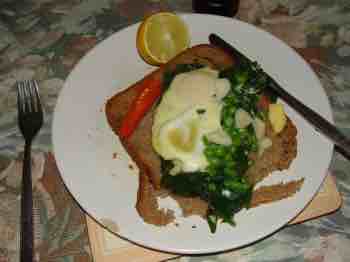 Eggs, spinach and true wholegrain bread are rich sources of betaine.
Eggs, spinach and true wholegrain bread are rich sources of betaine.The "take home" from this page is the importance of foods like beets, spinach and eggs; and 100% wholemeal bread. What is betaine is a very significant subject.
Look for our bread pages in the navigation bar; it takes only five minutes each day to bake an artisan loaf from freshly-ground wholemeal. I confess it; I'm crazy about real food that tastes good and can be prepared in a jiffy.
But you may have to purchase a mill to get the flour.
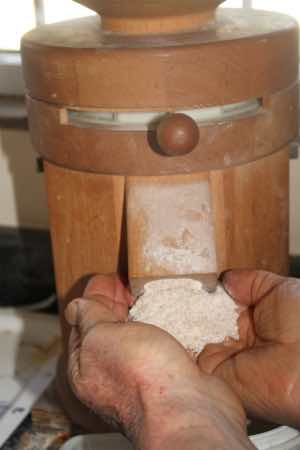 No true wholemeal flour in the grocery store
No true wholemeal flour in the grocery storeFree range eggs actually lower the risk of heart disease because of the betaine they provide; via choline.
Eggs Parkinson's disease
Eggs Florentine on wholegrain toast makes an excellent breakfast but is perhaps a little dull tasting. Adding legumes such as fava beans, limas or even green peas provides even more choline.
Fava beans also have the unique property of containing large amounts of L-dopa, the neurotransmitter that is lost in Parkinson's Disease.
Why is betaine? It's an essential compound for human health.
SUMMARY
- Foods rich in betaine and choline are essential for a healthy life.
- True wholemeal bread, eggs and dark-green leafy vegetables are good sources.
- Legumes like beans and peas are also good sources.
- On a traditional grocery store diet we get less than 50% of these important nutrients.
- The top 10 causes of death
- The betaine and choline content of whole wheat flour compared to other mill streams
- How to grow spinach
- How to cook beetroot
- The role of methionine restriction in cancer growth control and life-span extension
- The betaine and choline content of a whole wheat flour compared to other mill streams
- Concentrations of Choline-Containing Compounds and Betaine in Common Foods
- Dietary betaine and inflammation
When browsing use right click and Open Link in New Tab, or you may get a bad gateway signal.
From the horse's mouth
Newsletter
Our newsletter is entitled "create a cyan zone" at your home, preserving both yourself and Mother Earth for future generations; and the family too, of course. We promise not to spam you with daily emails promoting various products. You may get an occasional nudge to buy one of my books.
Here are the back issues.
- Lifestyle and ideal body weight
- What are ultra-processed foods?
- Investing in long-term health
- Diseases from plastic exposure
- Intensive lifestyle management for obesity has limited value
- A world largely devoid of Parkinson's Disease
- The impact of friendly bacteria in the tum on the prevention of cancer
- There's a hole in the bucket
- Everyone is talking about weight loss drugs
- Pull the sweet tooth
- If you suffer from heartburn plant a susu
- Refined maize meal and stunting
- Should agriculture and industry get priority for water and electricity?
- Nature is calling
- Mill your own flour
- Bake your own sourdough bread
- Microplastics from our water
- Alternative types of water storage
- Wear your clothes out
- Comfort foods
- Create a bee-friendly environment
- Go to bed slightly hungry
- Keep bees
- Blue zone folk are religious
- Reduce plastic waste
- Family is important
- What can go in compost?
- Grow broad beans for longevity
- Harvest and store sunshine
- Blue zone exercise
- Harvest and store your rainwater
- Create a cyan zone at your home
Did you find this page interesting? How about forwarding it to a friendly book or food junkie? Better still, a social media tick would help.
Address:
56 Groenekloof Rd,
Hilton, KZN
South Africa
Website:
https://www.bernard-preston.com